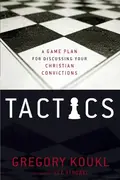Tactics by Gregory Koukl aims to give approachable methods for apologetic. The book makes apologetic and conversations about faith less intimidating. As opposed to other books on apologetic where arguments are the focus. This book focuses on how to ask good questions to give the other something to think about. It taught me that a simple clarifying question such as “How did you come to that conclusion?” can be so powerful. It taught me that successful apologetic isn’t about winning an argument, but to simply “put a stone in their shoes” and make the other really consider what they believe and what Christians believe. I wish I had read this when I was a first year in University because it would have made those early attempts on evangelism less daunting and much more fruitful. I believe anyone can benefit from this book. Especially for those who feel intimidated to engage in debates with non-believers.
My Notes
- Main goal of “apologetic”:
- To put a stone in their shoes.
- To give them something to think about.
- A rule: if anyone in the conversation gets angry, you lose
- If your opponent gets angry they will harden their heart and won’t listen to you
- If you get angry you seem less convincing and you have lost gospel witness
- Biblical call for apologetic:
- 1 Peter 3:15 - “but in your hearts honor Christ the Lord as holy, always being prepared to make a defense to anyone who asks you for a reason for the hope that is in you; yet do it with gentleness and respect,”
- Use your mind to reason
- There is strategy and there is tactics.
- Strategy is the content both defensive and offensive.
- Tactics refers to way you can deploy those content.
Tactics
Columbia Technique
- Respond to challenges and claims with questions
- Ask for evidence of their claim
- “How did you come to that conclusion?”
- “Can you clear his up for me?”
- “Can you help me understand this?”
- “Can you help with something that confuses me?”
- Are their explanations
- Possible?
- Plausible?
- Probable?
- Use questions to lead the conversation
- “Have you considered…”
- Let me suggest an alternative, and tell me if you think it’s an improvement. If not, you can tell me why you think your option is better.
- I wouldn’t characterize it that way. Here’s what I think may be a better or more accurate way to look at it. Tell me what you think.
- I don’t think that’s going to work, and I’d like to suggest why. Is that okay with you?
- I’m not sure I agree with the way to you put it. Think about this.
- If you don’t know the response to a question you can always disengage, and research so that you are ready next time
- “Let me think about it, maybe we can talk more”
Suicide
- Some claims are logically inconsistent. In this tactic we are pointing out logical inconsistencies in their reasoning
- Formal: logical contradictions
- Infanticide: the children claim depends on the parent claim, but the child claims that the parent doesn’t exists
- Saying that “vocal chords don’t exist” out loud
- Practical: Cannot be used as an argument practically
- “You can’t force your view on others”
- Sibling rivalry: Two views that can’t exists together
- Problem of evil: Can not use the problem of evil to explain that God doesn’t exist because without God what’s your standard for what is evil and good?
Taking the Roof Off
- Taking a point to it’s absurd conclusion
- Steps:
- State the claim
- Take it to its absurd conclusion
- make it face reality
- Therefore, the claim is wrong…
Just the Facts Ma’am
- Some time a claim is made due to false facts.
- You can defend by providing the facts.
- The more detailed and precise the better.
Rhodes Scholar
- Appeal to authority alone is no evidence for believing something
- An authority need to provide reasons for their claim
